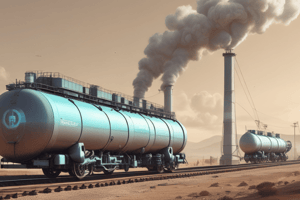Podcast
Questions and Answers
Which of the following sectors is hydrogen most critical to decarbonize in order to reach net zero emissions by 2050?
Which of the following sectors is hydrogen most critical to decarbonize in order to reach net zero emissions by 2050?
- Power production
- Residential heating
- Transportation
- Hard-to-abate industries (correct)
What are potential applications of hydrogen?
What are potential applications of hydrogen?
- As a refrigerant
- To produce synthetic fuels (correct)
- To produce heat and power (correct)
- To store energy (correct)
Which of the following processes can be used to produce hydrogen from methane?
Which of the following processes can be used to produce hydrogen from methane?
- Thermal decomposition
- All the mentioned technologies (correct)
- Pyrolysis
- Electrolysis
Which molecules are involved in the process of electrolysis for hydrogen production?
Which molecules are involved in the process of electrolysis for hydrogen production?
Which methods are utilized to produce solar fuels primarily made of hydrogen?
Which methods are utilized to produce solar fuels primarily made of hydrogen?
What type of reaction typically occurs in solar thermochemical fuel production?
What type of reaction typically occurs in solar thermochemical fuel production?
In the context of hydrogen applications, which of the following is NOT a function of hydrogen?
In the context of hydrogen applications, which of the following is NOT a function of hydrogen?
Which of the following is a characteristic of hydrogen that makes it a suitable energy carrier?
Which of the following is a characteristic of hydrogen that makes it a suitable energy carrier?
Which of the following is NOT an issue associated with storing hydrogen in cylinders or tanks?
Which of the following is NOT an issue associated with storing hydrogen in cylinders or tanks?
Which process is known to deliver high purity hydrogen (99.9%)?
Which process is known to deliver high purity hydrogen (99.9%)?
Which of the following is NOT considered an advantage of using ammonia as a fuel?
Which of the following is NOT considered an advantage of using ammonia as a fuel?
For which of the following processes is liquid biomass NOT needed for producing hydrogen?
For which of the following processes is liquid biomass NOT needed for producing hydrogen?
What is the main reason for including the water-gas shift step in a steam methane reforming process?
What is the main reason for including the water-gas shift step in a steam methane reforming process?
Which of the following sectors is NOT considered a hard-to-abate industrial sector?
Which of the following sectors is NOT considered a hard-to-abate industrial sector?
Is hydrogen produced using wind power the most promising clean technology in the UAE in the near term?
Is hydrogen produced using wind power the most promising clean technology in the UAE in the near term?
What is the maximum feasible level of blended hydrogen in natural gas transmission networks?
What is the maximum feasible level of blended hydrogen in natural gas transmission networks?
Which statement accurately defines 'green hydrogen'?
Which statement accurately defines 'green hydrogen'?
What does an autothermal reactor combine during the hydrogen production process?
What does an autothermal reactor combine during the hydrogen production process?
How does the specific heat of liquid hydrogen compare to water and oxygen?
How does the specific heat of liquid hydrogen compare to water and oxygen?
What role does CO2 play in underground hydrogen storage?
What role does CO2 play in underground hydrogen storage?
What is the correct definition of photocatalysis?
What is the correct definition of photocatalysis?
What is one key function of hydrotreating processes in refineries?
What is one key function of hydrotreating processes in refineries?
Which type of fuel cells do not require noble metals as they operate at high temperatures?
Which type of fuel cells do not require noble metals as they operate at high temperatures?
Flashcards
Hydrogen Blending in Gas Networks
Hydrogen Blending in Gas Networks
Blending a significant amount of hydrogen (up to 80%) into existing natural gas pipelines is feasible and requires only minor upgrades.
Green Hydrogen Production
Green Hydrogen Production
Green hydrogen production from water splitting is only considered environmentally friendly when the energy source used to split the water is renewable.
Water Gas Shift Reaction
Water Gas Shift Reaction
The Water Gas Shift reaction is part of a multi-stage process for hydrogen production. It removes unwanted traces of fuel components by further oxidation, leading to higher hydrogen purity.
Autothermal Reactor
Autothermal Reactor
Signup and view all the flashcards
Specific Heat of Liquid Hydrogen
Specific Heat of Liquid Hydrogen
Signup and view all the flashcards
Energy Density: Ammonia vs. Hydrogen
Energy Density: Ammonia vs. Hydrogen
Signup and view all the flashcards
CO2 Cushion Gas for Hydrogen Storage
CO2 Cushion Gas for Hydrogen Storage
Signup and view all the flashcards
Biomass Gasification
Biomass Gasification
Signup and view all the flashcards
Fuel Cell
Fuel Cell
Signup and view all the flashcards
Anode
Anode
Signup and view all the flashcards
Cathode
Cathode
Signup and view all the flashcards
Electrolyte
Electrolyte
Signup and view all the flashcards
Catalysts
Catalysts
Signup and view all the flashcards
Oxidation
Oxidation
Signup and view all the flashcards
Reduction
Reduction
Signup and view all the flashcards
Low-Carbon Hydrogen Certification
Low-Carbon Hydrogen Certification
Signup and view all the flashcards
Pyrolysis
Pyrolysis
Signup and view all the flashcards
Methane Separation
Methane Separation
Signup and view all the flashcards
Catalyst Regeneration
Catalyst Regeneration
Signup and view all the flashcards
Hydrogen Combustion
Hydrogen Combustion
Signup and view all the flashcards
Hydrogen Flammability
Hydrogen Flammability
Signup and view all the flashcards
Hydrogen Explosion
Hydrogen Explosion
Signup and view all the flashcards
Hydrogen Fuel Cell
Hydrogen Fuel Cell
Signup and view all the flashcards
Fuel Cell Applications
Fuel Cell Applications
Signup and view all the flashcards
Chemical stability of hydrogen.
Chemical stability of hydrogen.
Signup and view all the flashcards
Which process can deliver high purity hydrogen?
Which process can deliver high purity hydrogen?
Signup and view all the flashcards
Decarbonizing Cement Industry: Best Approach
Decarbonizing Cement Industry: Best Approach
Signup and view all the flashcards
Disadvantage of Ammonia as a Fuel
Disadvantage of Ammonia as a Fuel
Signup and view all the flashcards
Process NOT needing liquid biomass for hydrogen production
Process NOT needing liquid biomass for hydrogen production
Signup and view all the flashcards
Main reason for water-gas shift
Main reason for water-gas shift
Signup and view all the flashcards
Hard-to-abate industrial sectors
Hard-to-abate industrial sectors
Signup and view all the flashcards
Hydrogen from wind power in UAE
Hydrogen from wind power in UAE
Signup and view all the flashcards
CH4 addition for NOx reduction
CH4 addition for NOx reduction
Signup and view all the flashcards
How Fuel Cells Work
How Fuel Cells Work
Signup and view all the flashcards
What is Turquoise Hydrogen?
What is Turquoise Hydrogen?
Signup and view all the flashcards
Hydrogen Explosion Risk
Hydrogen Explosion Risk
Signup and view all the flashcards
Global Warming Potential (GWP)
Global Warming Potential (GWP)
Signup and view all the flashcards
PEM Fuel Cell Operating Temperature
PEM Fuel Cell Operating Temperature
Signup and view all the flashcards
Metal Hydrides for Hydrogen Storage
Metal Hydrides for Hydrogen Storage
Signup and view all the flashcards
Turquoise vs. Blue Hydrogen
Turquoise vs. Blue Hydrogen
Signup and view all the flashcards
Hard-to-abate industries
Hard-to-abate industries
Signup and view all the flashcards
Electrolysis
Electrolysis
Signup and view all the flashcards
Steam Reforming
Steam Reforming
Signup and view all the flashcards
Solar Fuels
Solar Fuels
Signup and view all the flashcards
Solar thermochemical fuel production
Solar thermochemical fuel production
Signup and view all the flashcards
Hydrogen applications
Hydrogen applications
Signup and view all the flashcards
Partial Oxidation
Partial Oxidation
Signup and view all the flashcards
Study Notes
Exam Instructions
- Exam contains 38 questions: multiple choice, true/false, and short answer.
- Multiple choice and true/false questions should be answered on the exam paper.
- Short answer questions should be answered in a separate exam booklet.
- Student must include name, ID, and signature on both exam papers.
- Pencils are not allowed; only pens are permitted.
Multiple Choice Questions (MCQs)
- Decarbonizing Emissions: Hydrogen is vital for reducing emissions by 2050, particularly in power production and hard-to-abate industries.
- Hydrogen Applications: Hydrogen can produce heat, power, and synthetic fuels; it also stores energy.
- Hydrogen Production from Methane: Pyrolysis, partial oxidation, and steam reforming are methods for producing hydrogen from methane.
- Electrolysis: Hydrogen is produced from electrolysis using water molecules.
True/False Questions
- Hydrogen Production from Wind Power in UAE: Hydrogen production from wind power is not the most promising option for the UAE in the short term.
- Blended Hydrogen: Blended hydrogen can be integrated into natural gas transmission networks.
- Green Hydrogen from Water Splitting: Producing hydrogen from water via splitting is generally seen as the most environmentally friendly choice.
- Water Gas Shift Reaction: This reaction is used to fully oxidize byproducts and enhance hydrogen purity.
- Autothermal Reactor: Combining steam reforming and pyrolysis in an autothermal reactor increases hydrogen production per unit of feedstock.
- Specific Heat of Liquid Hydrogen: The specific heat of liquid hydrogen is lower than both water and oxygen.
- Ammonia as Fuel: Ammonia has advantages as a fuel, including low NOx emissions and flammability.
Additional Questions (Exam Booklet)
- Turquoise Hydrogen:
- Describes a method of producing hydrogen by cracking methane.
- Produces solid carbon
- Discusses process details including temperature and catalyst usage (thermal vs catalytic)
- Explains advantages and disadvantages compared to blue hydrogen (including byproduct management).
- Hydrogen Fuel Cells:
- Briefly outlines the electrochemical process, describing the anode, cathode, and electrolyte.
- Notes the applications of hydrogen fuel cells (e.g., transportation, power generation).
- Hydrogen Safety:
- Explains hydrogen combustion's characteristics: very wide flammability range, requiring little energy to ignite, and producing less heat-dispersing power than hydrocarbon combustion.
- Details the explosion risk, noting that hydrogen is lighter and rises, so it would disperse in the air rather than concentrating near the ground.
Other important information
- Microbiological/Biofuel Cells: Biological systems can split water molecules (through photocatalysis) into hydrogen and oxygen using light.
- Alternative Hydrogen Production Sources: Includes descriptions of gasification, electrolysis, and processes to produce turquoise hydrogen.
- Hydrogen Storage Technology: Refers to the use of metal hydrides for physical hydrogen storage.
- Ammonia as fuel: Details advantages and the importance of it.
- Hydrogen Economy: Certifications of low-carbon hydrogen are needed to accelerate the uptake of hydrogen and contribute to the global sustainability goal.
- Hydrogen in steel production: Hydrogen is being researched for use to replace fossil fuels in the steel production process, thereby reducing carbon emissions.
Studying That Suits You
Use AI to generate personalized quizzes and flashcards to suit your learning preferences.




